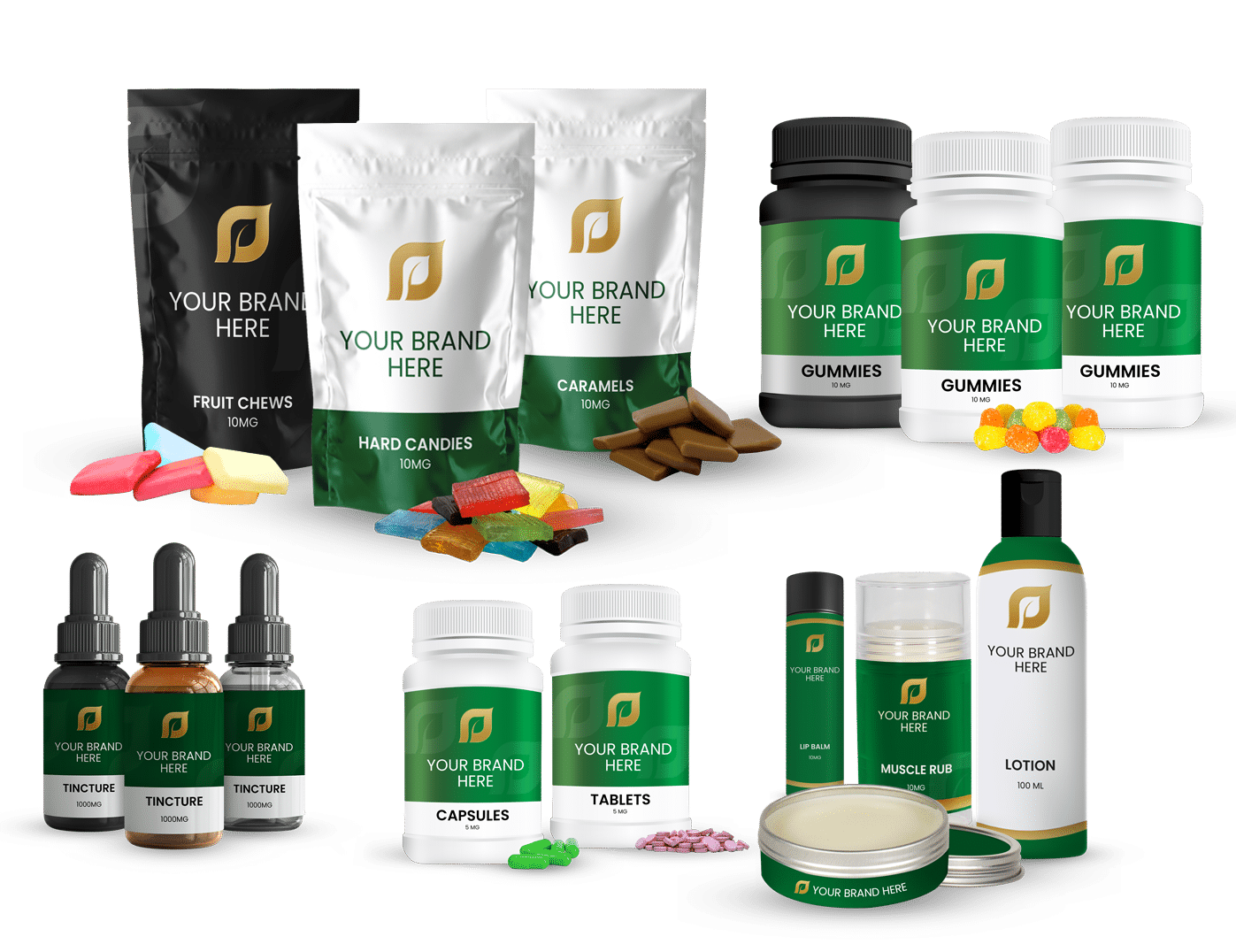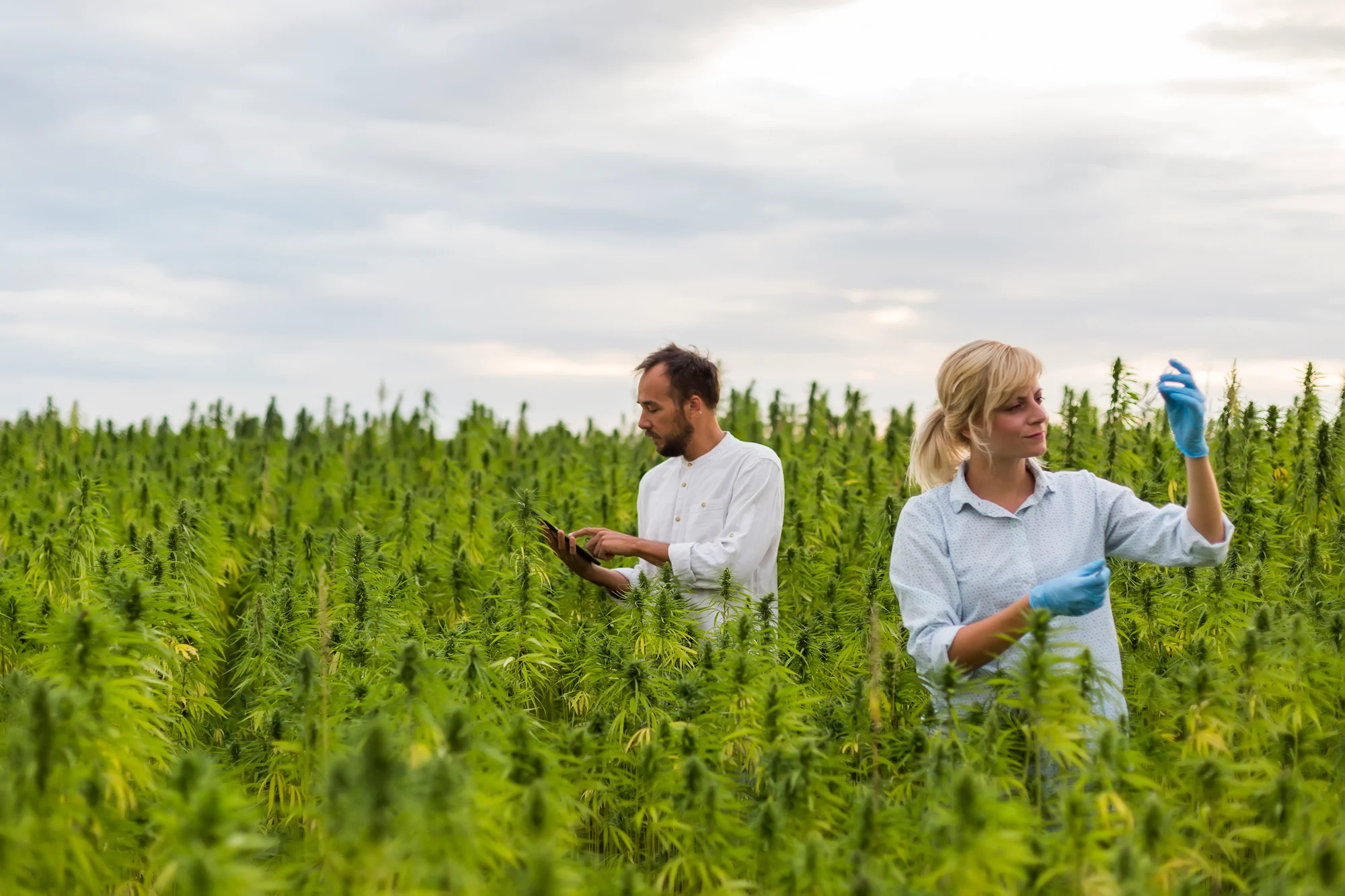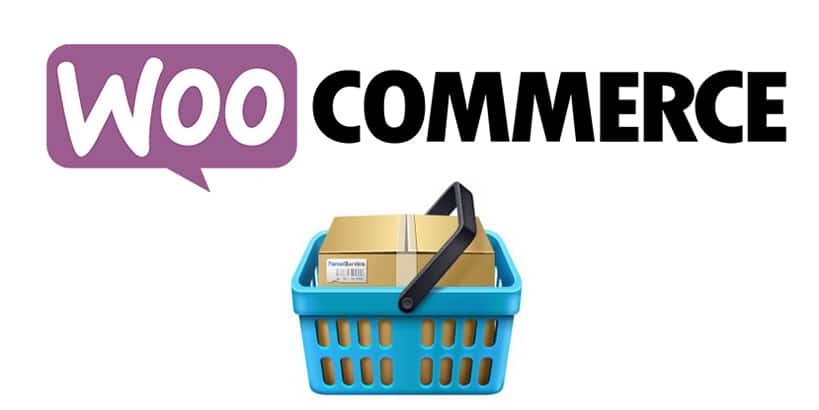Katie Devoe, co-founder of CBD Nationwide
If you’re just starting out in the CBD industry, you’ll soon find that there is a line between CBD manufacturers who make high-quality products and the shoddier, less quality-forward competition. The line may seem thin for those new to cannabis and CBD, but for an expert manufacturer or experienced brand, it’s obvious that the difference lies in the certificate of analysis (COA).
This certificate, a verified lab report, breaks down the ins and outs of each CBD product and helps brands prove the superior quality and safety of every product. The COA serves multiple purposes, like ensuring that CBD manufacturers produce products that meet legal guidelines. Most importantly, they help the brand establish consumer trust, which can quickly flourish into a healthy reputation.
Whether you’re looking to purchase wholesale CBD products for your store or prefer to sell private label CBD products, understanding the certificate of analysis and how to present it to customers is a crucial first step for CBD brands and small businesses.
What is a COA?
If you’re unsure, or you’ve never heard of a certificate of analysis, don’t worry—we’ll start with the basics. A certificate of analysis is potentially the single most important document related to the purchase of CBD products for informed consumers.
This document provides information regarding the cannabinoid content and terpene profile of each product. Further, a proper COA should include information regarding the purity of each product. In order to do so, tests are run to identify potential contaminants that could harm each batch.
At CBD Nationwide, we perform independent third-party lab testing that verifies the wholesome CBD content of every product. These tests also confirm that the marginal THC content in full spectrum products is always below the federally approved 0.3%. The testing also indicates nonexistent levels of THC in CBD isolate products. We also test for a lengthy list of potential contaminants, including pesticides, mold, heavy metals, microbials, herbicides, and residual solvents that could be left behind from the extraction process.
The COA serves a distinct purpose—to ensure that the consumer can verify the information on the label of each CBD product. This is incredibly important, as the Cannabidiol industry is still in its infancy, and is still widely unregulated. That’s why COA’s quickly became the standard among high-quality CBD products, a promising attempt at bringing regulation to CBD manufacturing and increasing buyer’s awareness.
Table of Contents
ToggleWhy Does the COA Matter?
The CBD industry is still very new and mostly unregulated. Although attempts are being made to design and enforce more regulations, for now, COA’s are the defining document that set high-quality CBD manufacturers apart from their cheap counterparts.
It’s easier to understand why COA’s are important when we look at examples of poor manufacturing practices that resulted in harm to the end consumer. For example, 52 people fell ill in Utah after consuming a CBD product containing a synthetic version of CBD, called 4-CCB.
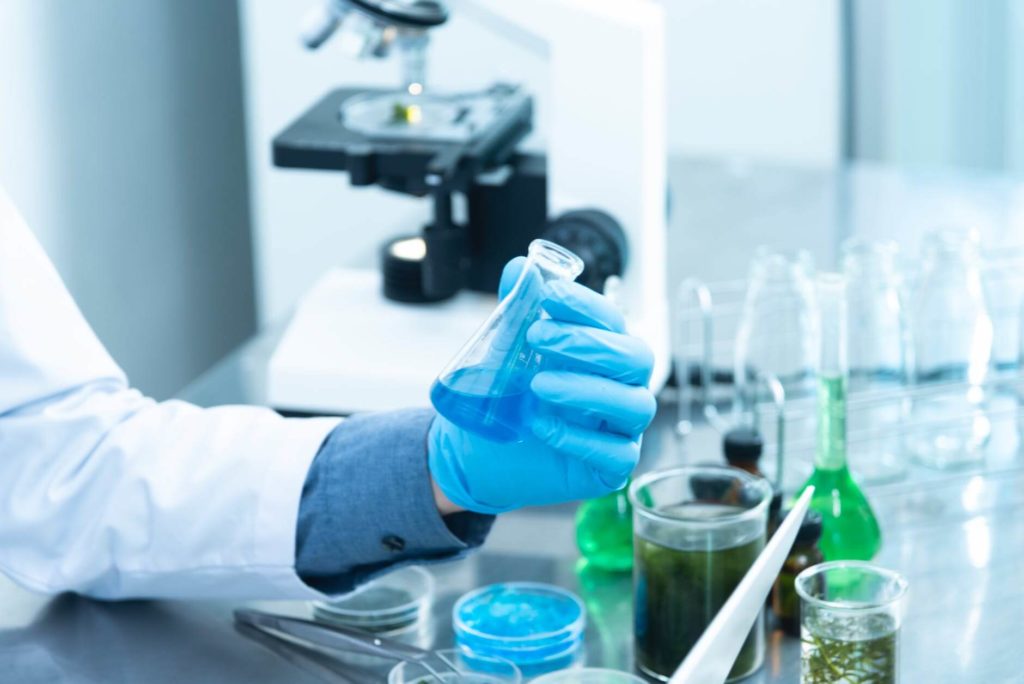
Another report shows a similar case, where popular CBD products were proven to contain potentially harmful ingredients, including synthetic THC and dextromethorphan, the active ingredient in some cough medicines. Both of these additives can potentially cause adverse reactions, especially when taken in large doses, and neither ingredient was listed on the label. Actually, a 2017 study suggests that as many as 70% of CBD products are mislabeled in some way, which could pose a threat to consumers.
Another reason the certificate of analysis is so important is that it authenticates the THC content of every product. For people who are THC sensitive or prohibited from THC use because or work or legal restrictions, ensuring the absence of THC is incredibly important.
The certificate of analysis is a way for a manufacturer and CBD brands to provide transparency to their consumers, as a record of proof of their high-quality, pure CBD products. Health conscious consumers should diligently look for this COA before purchasing a new product, as it ensures both that the product is safe and that they are getting exactly what they pay for, exactly as labeled on the product packaging.
Who Provides a COA?
A proper certificate of analysis will be provided by a third-party laboratory, generally, one that meets certain levels of certification relevant to the industry and the area. The reason that CBD manufacturers outsource for this crucial lab test is to eliminate bias, providing the consumer with test results they can trust.
CBD Nationwide utilizes only ISO-certified laboratories for our batch tests, where we examine both the purity and potency of every batch we produce. Because the laboratory we use holds themselves to industry-leading standards, we are confident in the results they provide. Every test can be traced back to its origination and includes a verification signature. The document fits nicely into our collection of documentation for every product, including reports on the growing, processing, manufacturing and distribution processes, all the way from seed to sale.
By providing this documentation to our clients, we give them the ability to provide the same assurance of quality and safety to their customer base. Choosing an expert manufacturer has many benefits, but our understanding and implementation of unique, verifiable documentation for CBD products sets us apart from most of the competition.
How Do You Read the COA of Hemp Products?
On the top of the document, you should be able to easily find information that identifies the product that was tested, including the batch number for the specific batch it was pulled from. Then, you should also be able to easily find information about the company who manufactured the product, with a direct contact line or address for the company’s spokesperson.
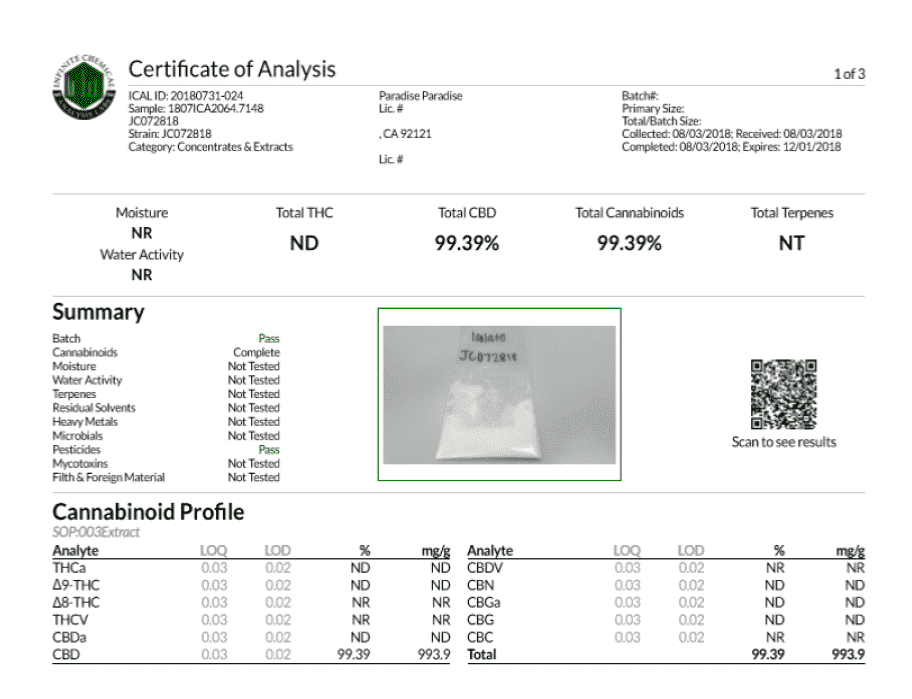
You will also find information about the laboratory where the product was tested. This information is critical to verifying the authenticity of the report. Now, many updated COA’s provide a QR code that links back to the lab and shows information on the particular batch test. To further verify the report, you should look for the signature of the lab manager that oversaw the batch test. This is also often at the top of the document, near the laboratory’s contact information.
Once you verify the identification and verification information, you can move on to the test results. At CBD nationwide, we test each batch of products for several things that are of utmost concern in the industry. Although the format of COA’s change depending on where they originate and the type of product tested, they should all have information regarding these crucial areas:
- Cannabinoid Content:
The first, and most obvious thing that the test results will cover is the cannabinoid content of the product. This means the report should list every cannabinoid detected, as well as the amount found in the product. Often, these are listed by weight, as well as by concentration, which may vary by unit. The most common way you’ll find this information written is mg/g, or how many milligrams of each cannabinoid is found in 1 gram of the product sample.
The cannabinoid analysis is where you will find information that verifies the CBD content of the product. Remember that 1 gram is equal to 1 milliliter, so if the report reads 2mg of CBD per gram, that means there are 60mg in a 30 mL bottle of the sample.
This is also where you will find information about the THC content of every product. CBD products made from industrial hemp should register a THC content of less than 0.3%. Broad spectrum CBD products should include a THC reporting of 0%, most commonly described with “ND” or non-detectable.
Other cannabinoids, like CBG and CBN, will be noted in this section too, if they are found in detectable amounts in the sample. For CBD isolate products, these should all read “ND” as well.
- Pesticides and Herbicide Analysis:
This section of the COA provides safety information for the consumer. It highlights any identification of pesticides or herbicides that were used or leftover from the growing process. Reports of CBD products derived from organic industrial hemp should verify non-detect levels of harmful pesticides and herbicides.
If pesticides and herbicides are detected in the sample, the report will also reveal the concentration in which each chemical was found. The report also should signify some idea of how much that amount is, usually by noting whether the product meets legal requirements of pesticide and herbicide contents. This is usually done with a “PASS” or “FAIL” indication beside each of the chemicals the laboratory tested for.
- Heavy Metal Analysis:
The COA will also provide information about heavy metals that could potentially be found in a product after the manufacturing process. The document will list all of the metals that were tested for, which usually includes lead, mercury, cadmium, and others. The results will list the amount found in the sample, generally by concentration based on the unit of measurement used. A common unit of measurement for the heavy metal analysis is “micrograms per kilogram.”
Because understanding these measurements can be confusing for some, the test usually indicates an idea of how to compare the amounts to “safe” ingestible doses. This section may be described as “use limits” and showcases the amount of each substance that is known by local (state) authorities to be safe for consumption. If any metals are detected in trace amounts, this gives a great frame of reference to what amount is considered “safe” and legal for sale.
- Mold, Residual Solvents, or Other Harmful Additives:
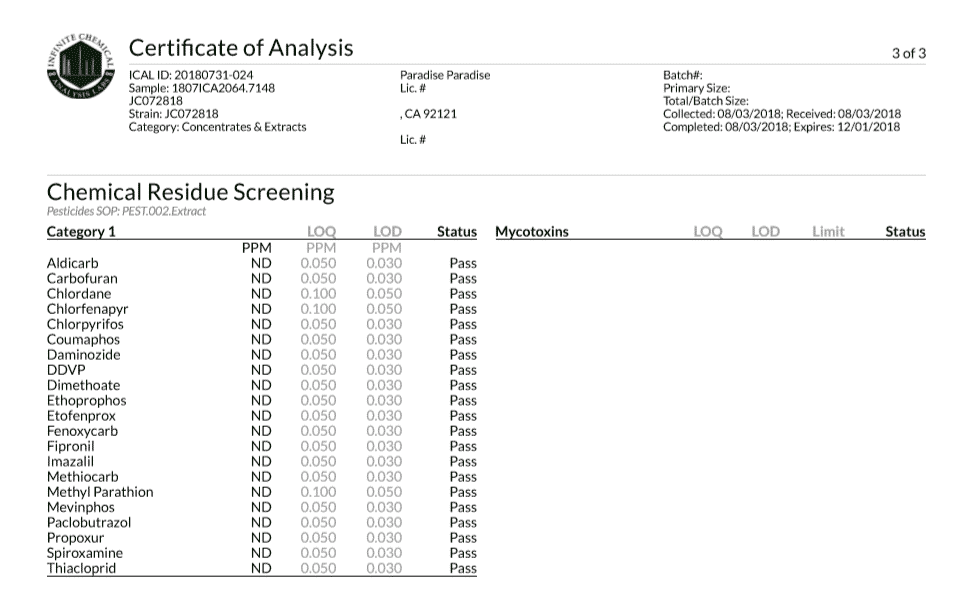
Further, a COA provided by a quality ISO-certified lab like the ones we work with will include information about other harmful additives, including mold, microbials, or residual solvents that could be left behind during the extraction process. Many manufacturers don’t include this information, but we feel that ruling these substances out is crucial to ensuring consumer safety.
If the certificate of analysis includes this information, it will generally include the substance tested for, as well as the unit and the concentration detected. We utilize these test results to rule out any harmful substances entirely, which is often signified with an “ND” rating.
- Terpene Profile:
The last thing on a certificate of analysis of hemp products is that it includes information about the terpene profile. This information is attractive for many consumers since terpenes have their very own potential health benefits, as well as attractive flavors and aromas that make them an appealing addition to many CBD products. Here, you’ll find information about the terpenes detected in the sample, as well as a unit and concentration to help you get an idea of what each product should smell and taste like, if applicable.
Watch Out for Shady Test Results
When looking to purchase wholesale or private label hemp products, you should definitely put emphasis on the certificate of analysis. In doing so, though, it’s important to watch out for shady test results. Due to the fact that there is currently little regulation in the industry, many low-level manufacturers attempt the “blur the lines” of certain test results by removing or omitting information.
For instance, some poor examples of a COA may leave out “THC” from the cannabinoid profile, giving the impression that there is no THC to be found in the sample. This is entirely misleading, and THC should be listed and marked with “ND” or similar to signify its absence.
Further, always make sure to verify the report by tracing it back to the laboratory. There, you can verify that the report was signed and authorized by the lab manager or director, or whoever oversaw the sample testing. If you cannot easily track the testing process to its source, there’s a good chance that the results have been tinkered with, if not fabricated entirely.

The COA Builds Trust that Trickles Down to the Consumer
The certificate of analysis serves many purposes, but its single most important duty is also its superhero ability: helping CBD manufacturers, brand owners, and retailers establish trust. At a time when CBD regulations are low, the COA is crucial to ensuring a high standard of safety across all cannabidiol products. We believe that the COA is not only necessary for every batch but should be a minimum requirement for any CBD product made or sold.
Every product we manufacture at CBD Nationwide undergoes a series of tests to ensure the potency and safety, including in-house testing as well as third-party lab tests. We provide the COA to our clients with confidence, providing them the tools they need to establish a trusting, fruitful relationship with the nation’s most established CBD manufacturer.
What’s best is the COA follows each batch through to distribution, so the same test results can be used to help establish consumer trust, and later brand trust, which can help you dig your roots deep into the industry, promising success for years to come. If you love the sound of wholesale of white label CBD products you can trust, contact us or request a quote today.


